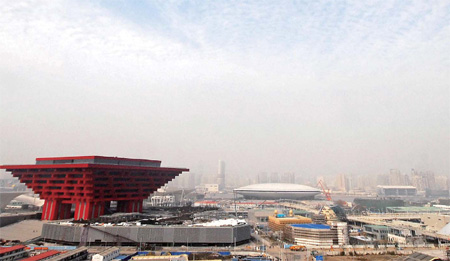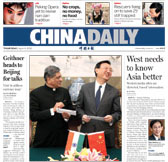


Edible cameras, cat coffee and diamond lotteries are just some of the highlights of what looks set to be a cultural feeding frenzy when the Shanghai Expo throws open its doors on May 1. China Daily reporter Tang Zhihao samples some of the best of the dizzying array of pavilions to help you navigate your way around the expo site.
Israel: Pills, camera, action
Albert Einstein once predicted that "Israel can win the battle for survival only by developing expert knowledge in technology". The country of 7.5 million has paid more than lip service to the Nobel Prize winner's words and will present its most sophisticated medical-science and energy-saving technology at its pavilion.
|
||||
The body will excrete the so-called "pill camera" within 24 hours, after which the images can be viewed by a physician. The whole procedure is said to be painless.
Nepal: Home of Buddha
The Nepal pavilion will reflect the country's strong Buddhist roots and culture, including a display of relics thought to have belonged to Siddhartha Gautama, the prince who founded Buddhism over two and a half millennia ago.
Siddhartha was born in the ancient Indian region of Lumbini, which is now part of Nepal. Thousands of devotees and pilgrims visit the area's Buddhist monastery every year to pay homage to the relics, a trip that is said to bring peace and happiness.
"Community livingand life in Nepalcan be taken as an example for many city dwellers to learn how,inthe midst of rapid urban development, one canlead a meaningful, peaceful and harmonious life," said pavilion director Binayak Shah.
It is the first time the relics will be exhibited outside Nepal, he said.
Indonesia: Coffee with a sting in the tail
Caffeine addicts will be able to buy a cup of aromatic kopi luwak (civet coffee) at the Indonesia pavilion. Due to its high production costs, the coffee sells for up to $600 (4,100 yuan) per pound, making it one of the world's most expensive coffees.
It is made from coffee berries that have passed through the digestive tract of the Asian palm civet, a cat-sized mammal known for its noxious scent glands.
The civets only eat the ripest berries, the inner beans of which pass through the animals' system undigested. This unusual procedure is favored because their enzymes break down the proteins that give coffee its bitter taste, giving it more chocolate-like flavor.
Japan: iRobot hits right note
Dubbed the "breathing organism", the Japan pavilion will highlight the role of advanced technology in helping people live more comfortable lives.
Japan has long been known for its pioneering work in the field of robotics and artificial intelligence. The host nation impressed visitors at the Aichi Expo in 2005 by parading trumpet-playing androids, but plans to go even further this time around in Shanghai by presenting machines that can play the violin.
To better cope with the background music that will be played inside the pavilion, the electronic virtuosos will get three months training beforehand. Other robots will show what they are capable of in terms of caring for the elderly and stepping in to plug manpower shortages.
A total of 12 robots will be exhibited inside the pavilion, including those serving as tour guides.
Belgium: Diamonds and chocolates
Belgium will give away 26 diamonds - one a week - and three million pieces of chocolate during the expo to give visitors a real taste of the country.
For a chance to win a diamond cut and polished in Antwerp, visitors will have to figure out the correct answers to general knowledge questions about Belgium's monarchy and geography, among other areas of interest. Winners will be chosen by a weekly lottery held every Sunday at 7 pm.
Diamonds were only mined in India until 140 years ago, after which South Africa, Brazil and others got in on the act, but half of the world's current stockpile originated in Africa. The lion's share of diamonds move through Antwerp, with the city is responsible for selling 70 percent of the world's commercial diamonds.
However, for most of us, Belgian chocolates are a far more affordable gift.
The country's pavilion will demonstrate how its famous chocolate is made by producing extravagant pieces shaped like Chinese landmarks, such as the Great Wall, at its chocolate factory. The factory will give away 25,000 chocolates each day.


